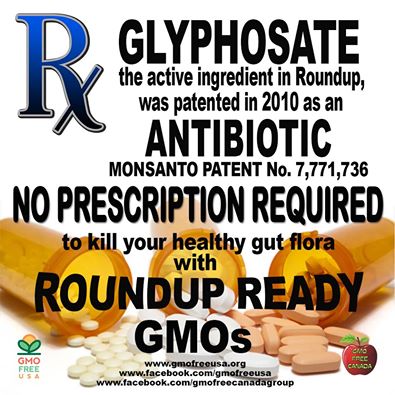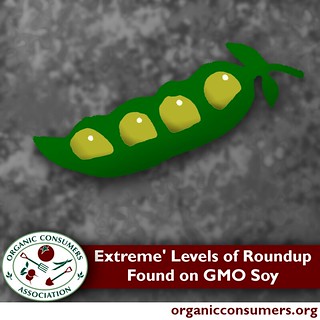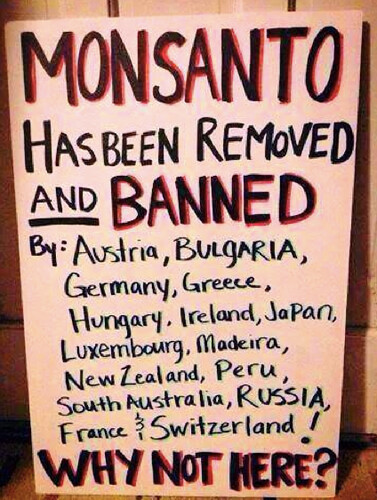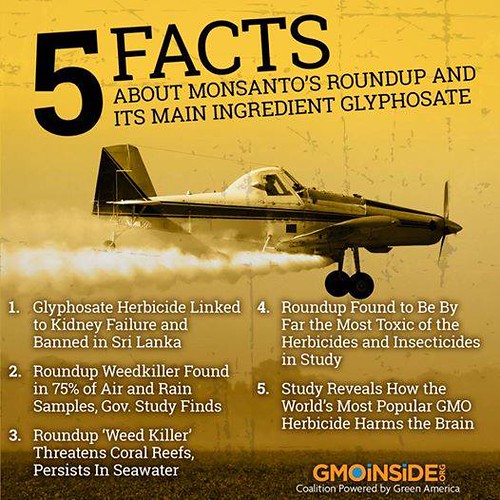Are GMOs Safe? No Consensus in the Science, Scientists Say in Peer-Reviewed Statement
This discussion thread was locked as off-topic by In_The_Wind (a host of the Latest Breaking News forum).
Source: eNews Park Forest
On the heels of USDA deregulation of the Arctic® apple -- the first genetically engineered apple -- leading consumer, food safety and environmental groups issued a response to widespread media reports wrongly characterizing the science on GMOs as settled.
The groups, including Consumers Union, Center for Food Safety, Friends of the Earth and Pesticide Action Network,pointed to a January 24 statement in the journal Environmental Sciences Europe -- signed by 300 scientists, physicians and scholars -- that asserts there is no scientific consensus on the safety of GMOs.
The claim of scientific consensus on GMOs frequently repeated in the media is “an artificial construct that has been falsely perpetuated,” the peer-reviewed statement said.
“Preeminent science bodies like the National Research Council have recognized that some engineered foods could pose considerable risk. It is widely recognized by scientists that those risks depend on the particular engineered gene and crop. It is unfortunate that self-appointed advocates for the technology have selectively cited the literature and organizations to suggest that GE crops, generally, present no risks that warrant concern,” said Doug Gurian-Sherman, PhD, senior scientist and director of sustainable agriculture at the Center for Food Safety.
<snip>
Read more: http://www.enewspf.com/latest-news/health-and-fitness/59288-are-gmos-safe-no-consensus-in-the-science-scientists-say-in-peer-reviewed-statement.html
pasto76
(1,589 posts)likewise no data to support they are safe. The jury, as they say is out.
pbmus
(12,422 posts)



Enthusiast
(50,983 posts)This was done in the interest of higher yields. But the human body has not been genetically modified and cannot withstand the presence of these herbicides in our diet.
Very simple. But believe as you wish.
bananas
(27,509 posts)Back when the Bulletin of Atomic Scientists started, the only technology seen as an existential threat was nuclear weapons.
As other technologies developed, they've been included in the famous "Doomsday Clock":
Overview
The Doomsday Clock is an internationally recognized design that conveys how close we are to destroying our civilization with dangerous technologies of our own making. First and foremost among these are nuclear weapons, but the dangers include climate-changing technologies, emerging biotechnologies, and cybertechnology that could inflict irrevocable harm, whether by intention, miscalculation, or by accident, to our way of life and to the planet.
<snip>
Biotechnology
Advances in genetics and biology over the last five decades have inspired a host of new possibilities--both positive and troubling. Over the past 10 years, in particular, there has been an exponential growth in new biology-based technologies, aided by integration of information and computerized software that allows rapid replication.
With greater understanding of genetic material and of how systems interact, biologists can fight disease better and improve overall human health. Scientists already have begun to develop bioengineered vaccines for common diseases such as dengue fever and certain forms of hepatitis. They are using these tools to develop other innovative medical solutions, including cells that have been bioengineered to serve as physiological "pacemakers." The mapping of the complete human genome in 2001 allows for even greater understanding of human functioning.
But along with their potential benefits, these technological advances raise the possibility that individuals or organizations could create new pathogens. Researchers with the best intentions could inadvertently create novel pathogens that could harm humans or other species. For example, in 2001, researchers in Australia reported that they had accidentally created a new, virulent strain of the mousepox virus while attempting to genetically engineer a more effective rodent control method. In 2011, scientists evolved a supervirulent strain of the virus H5N1 as part of an effort to discover a vaccine against the virus.
Unlike the biological weapons of the last century, these new tools could create a limitless variety of threats, from new types of "nonlethal" agents, to viruses that sterilize their hosts, to others that incapacitate whole systems within an organism. The wide availability of bioengineering knowledge and tools, along with the ease with which individuals can obtain specific fragments of genetic material (some can be ordered through the mail or over the internet), could allow these capabilities to find their way into the hands of groups bent on violent disruption. Such potential dangers are causing scientists, research institutions, and industry to put in place self-governing mechanisms to prevent misuse. But developing a robust universal system to ensure the safe use of bioengineering, without impeding beneficial research and development, could pose the greatest international science and security challenge in the early 21st century.
<snip>
Scuba
(53,475 posts)wyldwolf
(43,867 posts)Oh wait, you already did.
Enthusiast
(50,983 posts)on point
(2,506 posts)Most GMO, especially Monsanto round-up fail both tests I would say
NRaleighLiberal
(60,014 posts)just to name two more very important considerations. it is an extremely complex issue that doesn't lend itself at all to small soundbites or jumps to rapid conclusions (especially if said conclusions are funded by the major stakeholders)
uppityperson
(115,677 posts)There are many considerations and to say All is Good or All is Bad is way too simplistic.
RufusTFirefly
(8,812 posts)Many of the pro-GMO arguments create strawmen. Just as you say, it's an extremely complex issue and there is not one but many reasons to be on guard.
Enthusiast
(50,983 posts)KansDem
(28,498 posts)If you're putting salamander DNA in my tomatoes, I want to know about it. Capiche?
I don't think that's asking too much.
bobclark86
(1,415 posts)Capiche?
uppityperson
(115,677 posts)Thimerosal has been removed from or reduced to trace amounts in all vaccines routinely recommended for children 6 years of age and younger, with the exception of inactivated influenza vaccine (see Table 1). A preservative-free version of the inactivated influenza vaccine (contains trace amounts of thimerosal) is available in limited supply at this time for use in infants, children and pregnant women. Some vaccines such as Td, which is indicated for older children (? 7 years of age) and adults, are also now available in formulations that are free of thimerosal or contain only trace amounts. Vaccines with trace amounts of thimerosal contain 1 microgram or less of mercury per dose.
Dr Hobbitstein
(6,568 posts)is published in the SAME small publication (that ranks 190 out of 210 environmental science publications) that republished Seralini's discredited work. A look through the references they cite for their info include Seralini's study, Bloomburg News articles, WikiPedia entries, a GMO blog, and other sources that would be laughed out of Academia.
uppityperson
(115,677 posts)Dr Hobbitstein
(6,568 posts)is a relatively young publication with an almost non-existent impact factor.
The article is not legitimate. A scientific paper would not usually cite blogs, Bloomberg, or Wikipedia.
uppityperson
(115,677 posts)are not valid sources for a scientific paper.
Thanks for the info, appreciate it.
wyldwolf
(43,867 posts)Dr Hobbitstein
(6,568 posts)I won't say they have an agenda, but it's common place for a scientist to republish a discredited or retracted study in a low IF paper. And because the paper is low IF, it doesn't get reviewed properly.
wyldwolf
(43,867 posts)It's almost like getting a F on a science project, then making a few cosmetic changes and resubmitting it, hoping for a better grade.
alp227
(32,018 posts)Any bunch of "scientists" can get together to claim to be groundbreaking dissidents without going through the actual scientific publication process.
Dr Hobbitstein
(6,568 posts)RufusTFirefly
(8,812 posts)Their argument begins by dividing potential harm into two types. The first is localised and non-spreading. The second is propagating harm that results in irreversible and widespread damage. Taleb and co say that traditional decision-making strategies focus on the first type of risk where the harm is localised and the risk is easy to calculate from past data.
...
By contrast, harm that is able to propagate on a global scale is entirely different. “The possibility of irreversible and widespread damage raises different questions about the nature of decision-making and what risks can be reasonably taken,” say Taleb and co. In this case, the potential danger from a miscalculation can be essentially infinite. It is in this category of total ruin problems that the precautionary principle comes into play, they say.
...
When harm is localised, it can be used as part of the learning process to prevent the same set of circumstances occurring again. Global harm is different. “We should exert the precautionary principle here because we do not want to discover errors after considerable and irreversible environmental and health damage,” conclude Taleb and co.
The above excerpts are from The Physics arXiv Blog. Here's a link to the original study.
BTW, although I am adamantly opposed to nuclear energy, using the precautionary principle, Taleb and his colleagues explain why the risk of GMOs is more dangerous than that of nuclear energy. It's a provocative argument.
Here's the final paragraph from that paper's abstract (PP refers to the precautionary principle):
set of contexts and can be used to justify only a limited set
of actions. We discuss the implications for nuclear energy and
GMOs. GMOs represent a public risk of global harm, while
harm from nuclear energy is comparatively limited and better
characterized. PP should be used to prescribe severe limits on GMOS.
bananas
(27,509 posts)on edit: meant as a reply to post #1, so I moved it there.
wyldwolf
(43,867 posts)Published by the same group that published it, too.
DeSwiss
(27,137 posts)...it has been proven to be POTENTIALLY DEADLY.
GMO's aren't developed to make food better or more nutritious for the buyer's benefit. GMOs are developed to make greedy assholes more money by allowing poisons to be used without killing the plants themselves thereby reducing loss.
 - But hey, it's Monsantan's (et.al.) right to make these Genetically Mangled Organisms, right? You know, the economy -- free enterprise -- $$$$ -- god-given right to make a living -- and all that other shit. So what if you have to die a little sooner and your life sucks a littler harder as a result. Them's the breaks buckaroo when you live in the GREATEST NATION ON THE PLANET BAR NONE!!!!
- But hey, it's Monsantan's (et.al.) right to make these Genetically Mangled Organisms, right? You know, the economy -- free enterprise -- $$$$ -- god-given right to make a living -- and all that other shit. So what if you have to die a little sooner and your life sucks a littler harder as a result. Them's the breaks buckaroo when you live in the GREATEST NATION ON THE PLANET BAR NONE!!!!
K&R
lovuian
(19,362 posts)for a reason
Nobody trusts scientists anymore
Nobody trusts the government anymore
so they can rant and rave all they want for GMO
but the CONSUMER prefers ORGANIC
In_The_Wind
(72,300 posts)Post the latest news from reputable mainstream news websites and blogs. Important news of national interest only. No analysis or opinion pieces. No duplicates. News stories must have been published within the last 12 hours. Use the published title of the story as the title of the discussion thread.